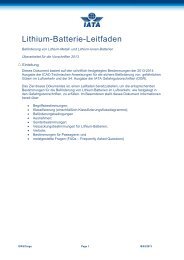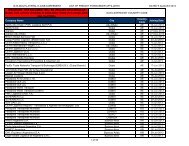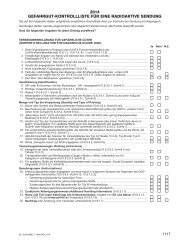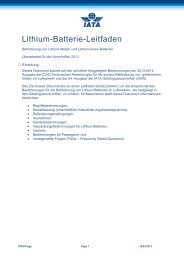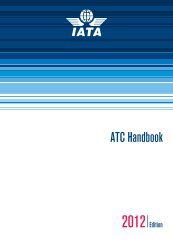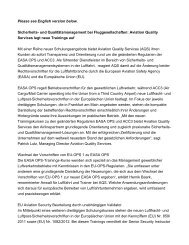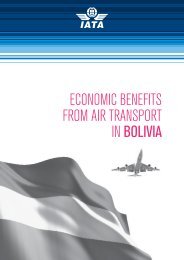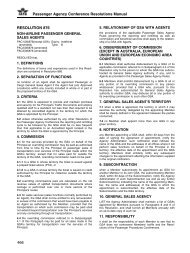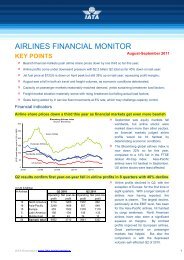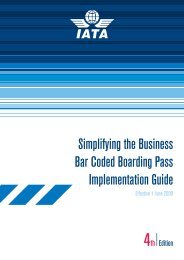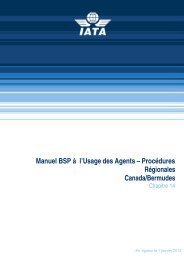Economic Regulation - IATA
Economic Regulation - IATA
Economic Regulation - IATA
Create successful ePaper yourself
Turn your PDF publications into a flip-book with our unique Google optimized e-Paper software.
07 - <strong>Economic</strong> <strong>Regulation</strong> 51<br />
This chapter discusses how an effective regulatory framework can be used to deliver efficiency improvements, but<br />
notes how some forms of regulation can provide little incentive towards greater efficiency. <strong>Regulation</strong> should set clear<br />
targets for performance improvement among the regulated companies, reflecting the different objectives faced at<br />
individual airports or ANSPs.<br />
These targets can be informed by clear and concise benchmarking procedures that allow for general comparison<br />
across companies, while taking due account of their different structures.<br />
Benchmarking systems are already used to great effect in other industries, such as the electricity and gas markets<br />
in Europe, while <strong>IATA</strong> has developed its own benchmarking scorecard that it uses for airport or ANSP charges<br />
negotiations.<br />
TYPES OF EFFICIENCY<br />
In considering the impact of regulation on efficiency, it is<br />
important to distinguish what is meant by the different<br />
types of efficiency. A particular framework may be strong<br />
in providing incentives for one form of efficiency but<br />
weaker in delivering improvements in other areas.<br />
The three types of economic efficiency are:<br />
Productive efficiency.<br />
This ensures that, for a given standard of quality, each<br />
level of output is produced at the minimum level of costs.<br />
The price-cap regulation framework contains strong<br />
incentives for regulated companies to improve their<br />
productive efficiency, with firms allowed to keep any cost<br />
savings below its target within each regulatory period but<br />
penalised for costs above target.<br />
By contrast, rate-of-return regulation is much weaker in<br />
delivering productive efficiency, with costs reimbursed<br />
whether they are minimised or not.<br />
Allocative efficiency.<br />
This ensures that prices are related to costs, with the<br />
level of output determined by where marginal cost equals<br />
marginal revenue (i.e. capacity is allocated to those who<br />
can maximise the financial and wider economic benefits<br />
from it). <strong>Regulation</strong> can help to improve allocative<br />
efficiency by improving transparency and in ensuring<br />
ICAO principles of non-discrimination are followed in<br />
setting charges.<br />
However, where an airport or ANSP is capacity constrained,<br />
productive efficiency improvements can reduce costs far<br />
below the market clearing price. Allocative efficiency is<br />
affected as prices do not take full account of the wider<br />
cost of capacity constraints 22 .<br />
Dynamic efficiency.<br />
This ensures that the level of quality and output<br />
improves over time to meet customer needs. In other<br />
words, it ensures that investment is delivered in a timely<br />
and cost-effective manner. Price-cap regulation, in<br />
particular the single-till system, is seen by some as a<br />
constraint on dynamic efficiency as it does not provide<br />
sufficient incentives (e.g. certainty on future returns) for<br />
investment.<br />
However, there is no clear evidence of this, with other<br />
factors, such as the planning system, often being the key<br />
constraint on investment. Price monitoring, rate-of-return<br />
regulation or contracts can help to improve the timeliness<br />
of new investment but require additional safeguards to<br />
ensure it is delivered cost-effectively.<br />
22<br />
In addition to congestion, there are other externalities, such as noise and local air pollution that can impact on allocative efficiency. Some airports<br />
have additional charges for these impacts, though they often fall outside the remit of economic regulation.



